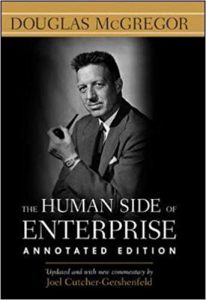Almost sixty years ago Douglas McGregor published what should have been a ground-breaking book called The Human Side of Enterprise. It contains pretty well everything you need to know about engagement, employee experience, cultural transformation and all the other hot HR topics of the 21st century, but hardly anyone outside of business schools has heard of it, let alone read it. Maybe it was just too far ahead of its time.
Sixty years later the world is a very different place, with companies like ours working to help businesses understand their staff experience so everything just works better. Management theorists of the 1960s would be pleased to find that the ideas they were chewing over not only improve employee experience, they also bring about improvements in KPIs like productivity, sickness and retention.
Why the delay? I think it has taken huge cultural, economic and scientific developments to bring us to the current revolution in understanding employee experience: in the cultural arena we have seen an increasing focus on individual needs; world economic forces have made efficiency in the knowledge economy vital to the survival of Western economies; and science has given us the tools to understand why earlier theorists’ ideas about human motivation might be useful in practice.
The brain science element can be problematic, by the way; when a new idea helps us to understand ourselves better there is usually a ‘bandwagon’ phase when people get carried away and start thinking that it is a complete solution to all problems, for example, the explosion of courses, apps and so on based on ‘neuroscience’ in the last five years. But while the work of people like Joseph LeDoux has illuminated the mechanisms by which stressed people make decisions, become upset, and vary in their functional intelligence, understanding those mechanisms doesn’t change what is happening, and the insights of earlier thinkers apply just as much as they ever did, in as far as they explain people’s behaviour.
Avoiding the negative consequences of stress and enabling employees to do their very best
However, what new science does do is add justification for the steps businesses need to take to avoid the negative consequences of stress. The corporate mind is just starting to think about the complex relationship between stress and profit, and I am sure that analysis of this relationship will be a major growth area in the age of AI.
Meanwhile, the era of philanthropic enterprises, like the Quaker companies that gave their workers housing with clean water and sanitation, has ended with the arrival of cheaper products and services brought round the world by the internet and cheap shipping. It isn’t yet survival of the cheapest, but any premium service has to be justified as never before by better quality, availability, customer service or whatever. This in turn means engaging employees so they want to do their very best at work.
It’s all about the individual
How to do that, when budgets are tightening as the world economy is faltering around the world? Anything based on assumptions about what people might want will inevitably miss the mark, represent unnecessary cost, and prevent the company offering something that employees really would appreciate – this is the time to focus right in on what really matters.
Progress depends on understanding, in the finest possible detail, who needs what at work. Given that information we can get away from blanket provision of training, team-building, engagement activities, benefits or whatever, and focus on providing what is needed at a small-group or even individual level. WeThrive’s platform listens to staff needs and understands what is missing in the employee experience, even when the employees are not conscious of the issues and sources of unhappiness, inefficiency or stress they face.
Key takeaways from The Human side of Enterprise
So, back to Douglas McGregor and The Human Side of Enterprise. McGregor was a professor in the MIT School of Industrial Management and researched how managers behaved, hoping to find out if successful managers were born or made. I urge you to read this book – it takes a little finding now but it is really worth the effort.
The language is a little old-fashioned in places, but this book is full of ideas that will challenge the way you think and work. Every page contains gems – here are just three:
“…’it is not possible to reach a managerial decision or take a managerial action uninfluenced by assumptions, whether adequate or not’; ‘the power to influence others is not a function of the amount of influence one can exert – it is rather a function of the appropriate selection of the means of influence which the particular circumstances require’; ‘relinquishing authority is seen as losing the power to control – this is a completely misleading conception.”
McGregor found that most managers worked according to one of two (probably unconscious) sets of assumptions (whether adequate or not), and he called them Theory X and Theory Y. Today we would call Theory X ‘command-and-control’ or ‘extrinsic motivation’; while Theory Y is practised by managers who understand ‘intrinsic motivation’. So far so what – but two things really make this book stand out.
First, McGregor does not just theorise about different management styles, he writes in depth about the practicalities of management in the light of his ideas. There are chapters on the implications for performance appraisal, salaries, promotion, leadership and the problem of improving collaboration between staff and management. Secondly, and most interesting to us at WeThrive, he wrote about the idea of integrating the needs of the organisation and those of the employee:
“The central principle which derives from theory Y is that of integration: the creation of conditions such that the members of the organisation can achieve their own goals best by directing their efforts towards the success of the enterprise.”
Fast-forward sixty years, and this is exactly what employee engagement or employee experience programmes should be helping companies achieve. Align things so that people’s own needs are met better at the same time as the organisation’s, and staff will work more usefully, feel less ill and become more loyal.
McGregor explained why these goals can be achieved at the same time – in fact have to be achieved at the same time for progress to be sustainable.

